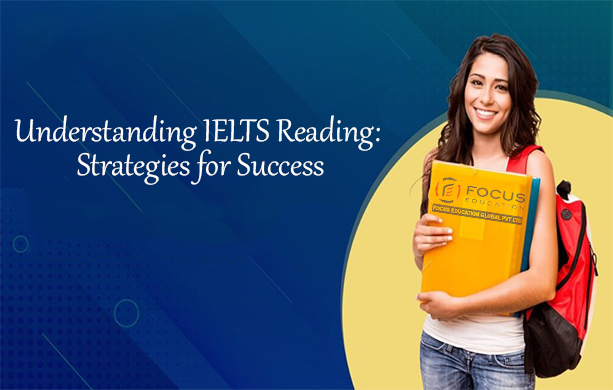Understanding IELTS Reading: Strategies for Success
The International English Language Testing System (IELTS) is a globally recognized English language proficiency test that measures your ability to communicate effectively in English. One of the key components of the IELTS exam is the Reading section, which measures the ability to understand and interpret written information. To succeed in the IELTS Reading test, it is crucial to develop effective strategies and enhance your reading skills. In this blog, we will discover some tips that help you understand and excel in the IELTS Reading section.
1. Familiarize Yourself with the Test Format:
Before starting your IELTS preparation, it is essential to understand the format of the Reading test. The IELTS Reading section contains three passages, each with a set of questions. The passages are taken from various sources, such as newspapers, magazines, or books. Being familiar with the test format will give you a clear idea of what to expect on exam day.
2. Skim and Scan Techniques:
Time management is the most important in the IELTS Reading test. Develop the habit of quickly skimming through the passages to get a general sense of the content. Furthermore, practice scanning for specific information by looking for keywords or phrases that relate to the questions. Skimming and scanning will help you to find related details efficiently.
3. Underline Key Information:
As you read the passages, underline or highlight key information. This could include main ideas, supporting details, or any data that looks important. This practice will not only help to stay focused but also make it easier to find answers when you refer back to the text.
4. Predict Answers:
Before reading the questions, try to predict possible answers based on your understanding of the passage. This proactive approach can guide your reading and make it easier to identify correct answers. Pay attention to the context and the tone of the passage to make accurate predictions.
5. Vocabulary Enhancement:
The IELTS Reading test often includes complex vocabulary. To enhance your understanding, work on expanding your vocabulary. Make a habit of noting down unfamiliar words and phrases, and practice using them in sentences. This will not only improve your comprehension but also aid in answering vocabulary-related questions.
6. Practice Regularly:
Like any other skill, reading proficiency improves with practice. Set aside dedicated time for regular reading practice. Choose a variety of texts, including academic articles, newspapers, and magazines, to expose yourself to different writing styles and topics.
7. Time Management:
The IELTS Reading test has a strict time limit, so effective time management is crucial. Practice answering questions within the allocated time for each passage. Develop a strategy for quickly moving on from a question if you find it challenging and returning to it later if time permits.
8. Simulate Exam Conditions:
To familiarize yourself with the pressure of the actual exam, simulate test conditions during your practice sessions. Set a timer, adhere to the time limits, and eliminate distractions. This will help you build confidence and perform better on the actual test day.
Achieving mastery in the IELTS Reading section is a step-by-step journey that demands ongoing dedication and regular practice. By integrating these tactics into your preparation regimen, you can elevate your reading abilities and boost your likelihood of excelling on the IELTS exam. Maintain composure, utilize time effectively, and adopt a strategic approach to each passage. If you are eager to enroll in an IELTS class that guarantees progress toward your target score, do not hesitate to visit Focus Education today and partake in a complimentary Demo class to kickstart your journey to success.



